
For Every Thing, There Is a Season
—From EF and CB—
It’s fall, and the trees are commencing their lesson in how to let go. That time has come for us and this blog, and we want to say thank you for visiting. This will be the final post here but we will continue as usual to post on Facebook under our own names. The site contract with WordPress requires long-term advance payment, so the site will still be here until 2027. All past posts will be retained as an archive, and the merch sales will stay available.
I thought that as time went on things would become simpler, but it doesn’t work that way. We’re both doing an immense amount of writing, and the routines that accumulate with age and health issues are more demanding. Whenever we’re moved to write these essays that will still happen, but only on Facebook, or whatever comes along that is a more tolerable platform.
Here are our email addresses, should you wish to stay in touch.
indepeye@gmail.com (Conrad Bishop)
lizful70@gmail.com (Elizabeth Fuller)
With love from the damnedfools
Surgery
—From CB—
Last Thursday, the day of my getting cut open.
I’ve had an inguinal hernia, right side, for about a year. I’ve put up with the inconvenience of wearing a truss in the expectation that I might die before having to spend a week in the goddamned hospital, but it was getting worse and I showed no signs of immediate death, beyond having trouble with balance and slowing down on my typing speed. I was greatly relieved, in my advance talk with the surgeon, that it could be done as an outpatient procedure, although I was startled when he said that they held the incision together with glue. But times change.
In preparation: the night before, I couldn’t have any alcohol. Okay. And the next morning, no food. I could have black coffee, but that lacked an appeal. So I checked the email and news and Facebook, and took my antibacterial shower. The day before, Elizabeth picked up my anticipatory pain prescription and a recommended bar of soap, and popped in the door with, “I’m back with your soap and your dope!”
Now I have to fill two hours before getting carted to the hospital to wait and to wait. I’ll spend the time writing, of course, perhaps reading the new New Yorker or listening to my audiobook, and trying to keep my mind off food. It does no good to let the mind wander to starving refugees: they too must be thinking of food, and they can’t listen to an audiobook.
I hear a sound like a meow, and I think something’s wrong with my breathing. Then I see one of our cats walk by. Perhaps it’s an out-of-body experience. I’m rattled.
But I shouldn’t be. This will be an outpatient procedure, the surgeon is highly recommended, and I’ve had much more serious damage. I’ll be home by late afternoon and can eat. Yet I’m rattled by a meow. I’m a cockroach scuttling across the counter for cover, bent on survival. I want to ask the cat, in those haunting lyrics from The Medium, “Was it you? Was it you?” But I’d never hit the high notes.
My whole life is blaring back. Our two years in South Carolina. There, they weren’t called roaches, they were palmetto bugs, and they were huge. They wouldn’t have to scuttle for cover; they could just stand and fight like Stonewall Jackson. And one summer, moss grew in the wax on our dinner table, regardless of their stomping. Those were our formative years.
So today I get driven to the hospital. After the ID checks and the check-in, to make sure I’m who I say I am, I’m sat in a chair and carted back to a bed. The same questions I’ve been asked a dozen times, and then it’s time for inserts. The thin shaky nurse has some trouble finding a vein, but at last she does, “a little pinch,” and I’m free to read—an article about ethics, another on spy operations in Norway, lots of chatter from nurses outside the drawn curtain (“So we were going up to Oregon, but…”).
At last, after two or three hours, the surgeon appears (“It’s not going to be long now. Any questions?”), and soon they wheel me away. At the surgery, someone holds a mask to my face (“Breathe deep.”), and I’m out. I wake up. It’s done, and I missed it all. They wheel me back.
Tubes out, and they ask me to pee in a urinal (“We need to make sure that everything’s working.”). I can’t, having just peed before surgery, but it’s possible that things are not working. They give me a sheet of post-op instruction, instruct me that if I haven’t peed till bed-time to come back to the ER. They remove the IV, I dress, and they summon Elizabeth by cellphone to drive up front. I’m hustled into a wheelchair and carted to the door. She’s brought me an egg salad sandwich, and I gobble it.
#
At various stages, I recall the surgery on the other side of my groin when I was sixteen or so. It put me in the hospital for a week, and here I was out in six hours. Medical science has improved a lot, or at least it’s speeded up. What hasn’t changed is the boredom of endless waiting.
Which means I have no excuse. I hereby rejoin the human race, for whatever that’s worth, and all its moral dilemmas, its crimes, its comedy. And after drinking a cupful of water, I even pee.
#
The experience? Surely not a joy in the hours of waiting, the pain of the “little pinch,” or the next day’s discomfort, even though it was eased by Acetaminophen and didn’t require the heavier dosage of an opioid prescribed if needed. It wasn’t even in the relief that came from the repair, as the area was still swollen and I had to protect it from the cat’s feet, which pay no mind to the advances of humankind. Yes, I do look forward to a life without discomfort till the next thing waiting in line says, “Me now!”
But I joy in the tiny advance of human skill. Surely we haven’t advanced much in preventing people getting blown up, or preserving the planet, or avoiding massive exploitation, even in waiting two months for an appointment. But just the joy of getting repaired after a blow-out: car tires and then me.
I have to celebrate my luck. Other friends have died of colon cancer; others have had breasts removed; others have dropped dead of sudden stroke. I’m still alive, for whatever good I can do. Not much, but some. I’ll try.
20th, I get up at five a.m. to stumble to the bathroom. It still works. On the way back to bed, I totter against the wall, and my wife asks, “Are you okay?” I mumble something reassuring. I feel blest for having someone to ask me Are you okay? and to make the morning coffee. Later, drinking the coffee, I thank her for all the added things she does for my nursing care—perhaps it comes from the fact that my son was a nurse for a while, and I doubt he got thanked much. Maybe the larger paycheck now (for software) makes up for that—we don’t thank people much if they’re getting paid, even if it’s something sorely needed. I need to remind myself, on the follow-up visit, to thank the surgeon.
###
Blanca’s Cave. . .
—From EF—
Sometime around 1998 I decided I should try to do something about my fragmented inner self, and I created a series of seven integration rituals. I’d been given a big hint when a song downloaded itself into my brain during a long drive. “Seven sisters, each one an only child, crowded in a room where no one has the key.” It described each sister in a phrase, but left one out—Blanca.
There’s a hidden pocket of my mind I call Blanca’s Cave, and it contains a list of tasks I haven’t dealt with. When I’ve delayed something past some magic line, it goes into Blanca’s Cave and disappears from my memory. It sits there in the dark and sometimes itches, but mostly it’s hidden from me until something reminds me.
I’ve had a harsh flurry of these in the recent past. I don’t know if it’s because I’m stirring stuff up with internal family systems therapy, which I’m loving, but it does keep surprising me. I came home from a brief jaunt to Italy and had plenty of time to write this by the weekend. Missed the deadline. Tried again, missed again, and Blanca got it. I managed to grab it by the tail and thought, “What am I gonna write about?” (I never pre-plan these things), and then of course got the answer. Write about Blanca’s Cave, dummy.
So with this out of the way, I need to move on to whatever Blanca’s got, deal with it, and insist on thanking myself. I’ve got a backlog to deal with, but the trick is to reinforce success, one damn puddle at a time. I think I’ll start with the morning glories, which have decided to take over the whole yard.
Onward.
###
Book Project. . .
—From CB—
I’m writing another book. Don’t know if I’ll call it a memoir or novel, but the title will be “Joy.” A novel has the advantage of leaving things out or telling flat lies, whereas memoirs are expected to tell the whole truth, though they rarely do. The first part will be the “He” section, the second the “You,” the third the “I.” I’ve written the first two (there’ll be many rewrites, of course), but the third—a search for the joy in living at age 82—or 83 by the time it’s finished. I’m keeping a diary of small things, and it makes me appreciate being alive.
But I can’t keep my mind from chewing on the election. I remember Carter’s “malaise” speech: surely one of the most honest and most disastrous speeches in political history, falling victim to Reagan’s can-do smile. But its message is now repurposed: a candidate is saying America is doomed but “I can fix it all,” and this is taken by millions as the answer to the fact that the world is changing, that not everyone is a blllionaire or even respected. But the candidate is respected for his courage in telling obvious lies.
I know we’ll live through it, me or at least my kids. It’s been worse, and life has gone on. The election might even turn out fine, to my taste, though I’m not a betting man. My politics are frankly way left of center, though I’m constantly critical of the rhetoric of my tribe, and ideologues don’t like to be nit-picked. But I’m trying to chronicle the small moments, since that’s mostly what life is. Not that life’s not affected by politics—you don’t have a great time if you’re starving or getting blown apart or even if you’re living, in Thoreau’s phrase, a life of quiet desperation.
Oddly, my purpose was reinforced by watching a 1973 film Visions of Eight —eight short films of the 1972 Olympics, each by a leading director. It chronicled the winners, of course, and the tremendous strain of the competition. But also the losers: the massive weight-lifter who can’t quite make it and lets the barbell fall; the boxer who rants in defeat; the stretcher cases in track and wrestling. And the marathon runner, long after most have finished the race, running in the dark, determined to finish. These are never seen, and must be.
I feel that many of us lead lives of defeat, made so by our expectations, born of our culture’s values. Not that we shouldn’t all shoot for the moon—just that if we get no higher than clearing the bar on the pole-vault, we deserve respect (and self-respect) for the vault. In eighth grade, there was a city-wide track meet. I ran in the fifty-yard dash against other eighth-graders. I came in last. When I caught my breath, I went on to other things.
###
Solo. . .
—From EF—
I’m about to embark on a 5-day solo trip, the second one this summer, and probably the last for quite a while. This time it’s to Italy to see our daughter, her wonderful man, and spend time in their 14th-century stone mill house while it’s still their abode. It’s beautiful, and they put their hearts and souls into giving it better plumbing, heating, and electrics. (We think differently now from those millers of long ago.) But the time has come for them to say farewell to the twisty twenty-five minutes of driving narrow mountain roads it takes to buy an aspirin or go to work. I need to be there one more time—to hug Fra, celebrate Jo’s magnificent cooking, and put my bare feet on a flagstone floor that was crafted before Columbus sailed.
And I’m going alone. CB and I have traveled to Europe together more than a few times, but it’s not his favorite thing to do any more, and he’s happy to stay home and console the cats. I’ve prepared and frozen a large array of delicious dinners, things I know he loves, so I’ll still have a daily presence.
When Johanna relocated to Italy in 1998 I began what is by now a 26-year chain of transatlantic journeying, most of it solo. I love it. All of it, even the wild things like finding myself on the streets of Rennes at midnight without anywhere to go—Air France went on strike and my flight to SF was canceled. I’d thought I could hang out in the train station, but nope. By luck and grace I found a businessman’s hostel that was full up but they were just kicking somebody out for misbehaviour. They didn’t seem to care that I wasn’t a businessman.
There’s a beautiful little island off the northwest coast of France, Belle-Isle-en-Mer, and it has called me back for many many visits. Ten miles long and five miles wide, with sandy beaches on the east and wild rocks on the west, and over five successive years I managed to hike the entire perimeter, fjords and all, plus the north-south line and the east-west one. Alone. Well, not really. The earth there speaks to me.
I love the trains, and the old-style coaches best of all, the ones that don’t exist any more. My favorite train was the night train from Amsterdam to Paris. Each car had a series of small six-person compartments, three seats facing three, with a corridor that ran the length of the car. It was always a crap-shoot whether there was a jerk or two there, but over the years I learned enough tricks to have a good chance at having a compartment to myself, which meant being able to lie down flat to sleep.
I had a good friend in Amsterdam, theatre colleagues in Zurich, Johanna in Italy, and the stones in Brittany. For many years a rail pass was affordable and easy to use, and the idea of just being able to jump on a train at whim was a lot of fun. Once it got me into trouble, though.
In Amsterdam the day before my return, I had time to kill and hopped a northbound train to ride to the end of the line and back. At the northmost station I had urgent need of a restroom and made it in the nick of time. However, I had all my travel stuff with me and didn’t do due diligence in reassembling myself in the dark little cubicle. What I missed was, of course, the smallest and most essential bag, the one with my passport, money, and plane ticket. I ran back to the station, but it was already gone. I made a police report, and a sympathetic conductor let me back on the return train.
The next morning Theo took me to the Consulate, where I was told by a curt front-desk lady that I’d need fifty dollars and it would take three weeks for a new passport. She wasn’t impressed by my dilemma: “My plane leaves in five hours, and you really don’t want me hanging around your country with no money.” I sat down in a corner of the waiting room and prevented myself from crying. A kindly lady sitting nearby came over. “I heard your problem. Take this thirty Euros, it’s what I can spare. Good luck.” Just then the head consular official showed up for work, and listened to my story. He gave me five Euros to take to a place down the street that would make a passport photo, then manufactured a temporary passport right there in his office. I still have it. The face on that photo is a perfect blend of stress and joy, a fitting emblem for solo travel.
###

A weekly view of the world we
wake into every morning.
Books and Media by
Bishop & Fuller
 A Visit to Life:
A Visit to Life:
micro-fictions
 Mica: 25 Flashes
Mica: 25 Flashes
more micro-fictions
 Flashes & Floaters:
Flashes & Floaters:
14 Fictions
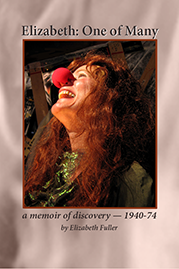 Elizabeth: One of Many
Elizabeth: One of Many
(1949-74)
![]()
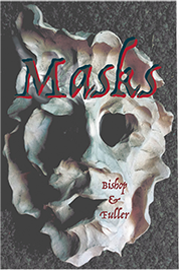 Masks
Masks
a historical fantasy
![]()
 AKEDAH: THE BINDING
AKEDAH: THE BINDING
a novel of promises broken or kept
![]()
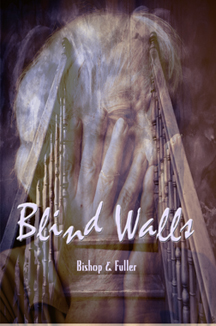 Blind Walls
Blind Walls
a novel of blue-collar ghosts
![]()
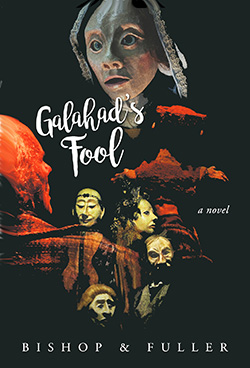 Galahad's Fool
Galahad's Fool
a novel of puppets & renewal
![]()
 Co-Creation:
Co-Creation:
50 Years in the Making
A Memoir of the Creative Life
![]()
 Rash Acts
Rash Acts
35 Snapshots for the Stage
![]()
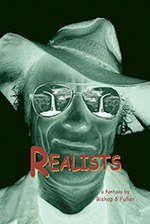 Realists
Realists
A Novel of Dystopian Optimism
![]()
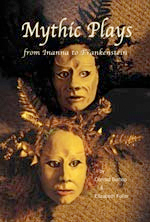 Mythic Plays
Mythic Plays
From Inanna to Frankenstein
![]()
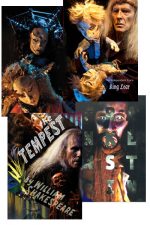 DVDs
DVDs
Stage Performances!
![]()



